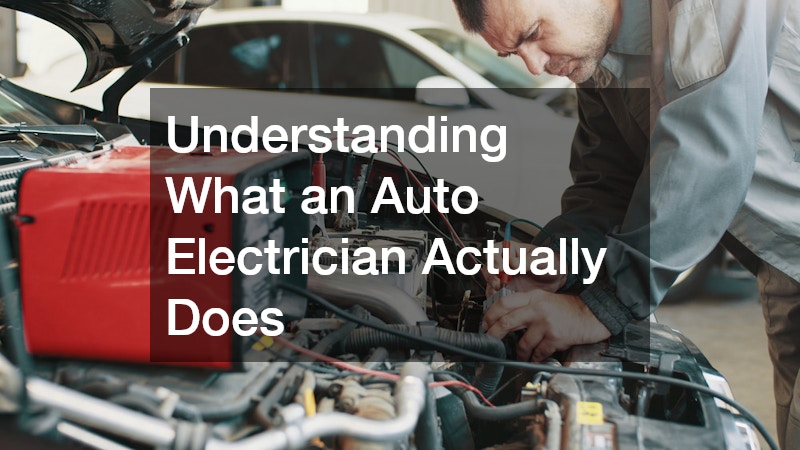When a vehicle experiences electrical problems, it can be confusing to know exactly who to call or what kind of specialist is required. Many people have heard of an auto electrician who deals with these issues, but might not fully understand the extent of their work. This skilled professional plays a crucial role in keeping cars, trucks and other motor vehicles running smoothly in today’s increasingly electronic automotive world.
The Role & How It Differs From A Mechanic
Most people assume that all vehicle repairs fall under the umbrella of mechanics, but this specialist focuses on the electrical and electronic systems within vehicles. Mechanics concentrate on mechanical components such as engines, transmissions and brakes, whereas this expert works specifically with wiring, circuits, batteries and electrical parts. The rise of technology in vehicles has made this role even more critical. Modern cars depend heavily on electronic systems for everything from engine management to safety features. This professional diagnoses electrical faults, repairs wiring and replaces faulty components to ensure the vehicle operates safely and efficiently.
What They Do On A Daily Basis
Their work covers a wide range of tasks, all linked by a focus on electrical systems. They inspect and repair starting and charging systems, which include ensuring that batteries, alternators and starters function properly. Without a reliable electrical supply, vehicles simply will not start or run correctly. They also maintain vehicle lighting and indicators, fixing issues that may affect headlights, brake lights or turn signals. Ensuring these lights work properly is vital for safety and legal compliance.
Another major area involves engine management systems, where computers control fuel injection, ignition timing and emissions. Using specialised diagnostic equipment, faults in sensors or control units can be identified and repaired.
Why This Work Is Important
Electrical faults in vehicles often start as minor issues but can quickly escalate into serious problems if ignored. A simple issue like a flickering light or a dead battery can result in dangerous situations or costly repairs. Regular maintenance and inspections by a qualified professional can identify early signs of wear, such as corroded terminals, damaged wiring or failing components. By addressing these problems promptly, vehicle owners avoid inconvenient breakdowns and improve the overall reliability of their vehicles.
For example, a faulty alternator may cause the battery to drain completely, leaving the driver stranded. Timely testing and replacement of such parts prevent complete failure. This work also ensures compliance with road safety regulations, keeping vehicles legally roadworthy and safe for drivers, passengers and other road users.
Diagnostic Tools & Techniques Used
One of the key features distinguishing this specialist from general mechanics is the use of advanced diagnostic tools. Modern vehicles are equipped with onboard computer systems that constantly monitor hundreds of sensors. When a fault occurs, the vehicle’s computer stores error codes that help identify the source of the problem. Specialised scanners and software are used to access these codes and perform detailed fault analysis.
This diagnostic process reduces guesswork and speeds up repairs, making them more efficient and less costly. Whether the issue is related to engine misfires, airbag malfunctions or anti-lock braking systems, these tools help pinpoint exact faults that require attention. This technology-driven approach is vital given the complexity of modern automotive electrical systems.
When To Seek Professional Help
Certain vehicle issues clearly require the intervention of a specialist. For instance, if a vehicle will not start and there are signs of electrical faults, it is advisable to seek expert assistance. Similarly, dashboard warning lights that remain illuminated or flash unexpectedly often indicate electrical problems needing professional diagnosis. Malfunctioning headlights, brake lights or indicators should also be inspected, as these are critical for safe driving.
Power-operated accessories such as electric windows, locks or mirrors may also develop faults requiring specialist repair. Security systems that behave erratically or stop working altogether are another common reason to seek help. Finally, before installing aftermarket electrical equipment such as sound systems, driving lights or reversing cameras, it is wise to engage a qualified professional to ensure the installation is safe and complies with regulations. Attempting to fix electrical issues without the correct knowledge or tools can cause further damage or even create safety hazards.
Choosing The Right Specialist For Your Vehicle
Finding a qualified professional is important to ensure quality service. Look for technicians who hold recognised qualifications in automotive electrical systems or have completed relevant apprenticeships. Membership in professional associations or positive reviews from previous customers can also indicate a reliable and trustworthy service provider. A reputable expert will clearly explain the nature of the problem, provide a written quote for repairs and use quality replacement parts. They will also thoroughly test their work to ensure your vehicle is safe and fully operational before returning it to you.
Vehicles today depend heavily on complex electrical systems to function correctly and safely. The specialised skills of an auto electrician are crucial to maintaining these systems and ensuring vehicles remain reliable on the road. By understanding what they actually do, vehicle owners gain a greater appreciation of the expertise required and the benefits of regular electrical maintenance.
If your vehicle shows any signs of electrical issues or you plan to install new electrical equipment, trusting a qualified auto electrician is the safest and smartest decision.

